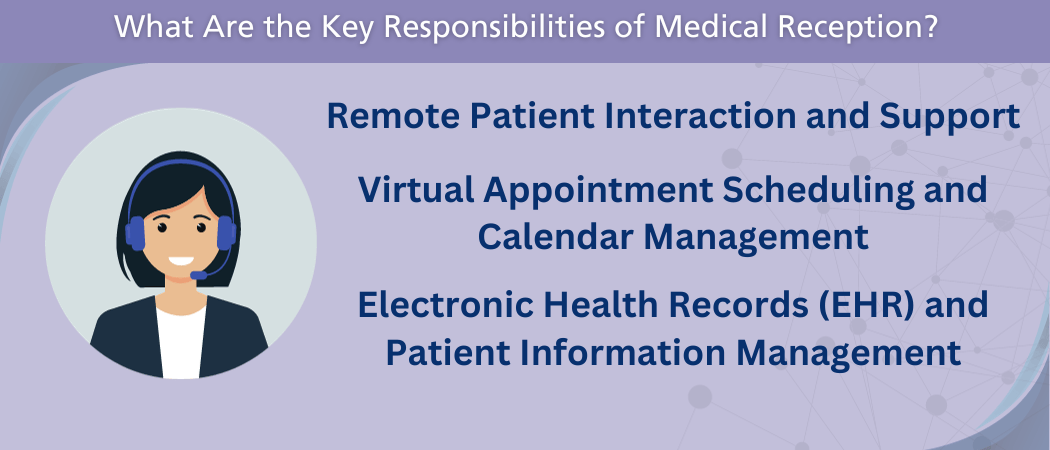In the complex world of healthcare, employing a medical virtual receptionist is key to enhancing your patient interactions and administrative efficiency. That’s because a virtual front desk for medical practices doesn’t just streamline the day-to-day operations, but also redefines the standard of patient care. Not only can they perform multiple tasks—like answering patients’ questions and organizing your office’s schedules—with the same level of friendliness and efficiency as an in-person receptionist, but it only costs a fraction of a full-time employee.
So what is a medical receptionist job description? And what front office medical assistant duties can be performed by a virtual receptionist? In this blog, we’ll explore these questions, as well as lay out what responsibilities are most important to help all of your patients have a great experience.
What Is the Job Description of a Medical Receptionist That’s Virtual?
The role of a medical receptionist—traditionally filled by someone at the front desk of a medical office or hospital—continues to evolve, especially with the rise of virtual reception services. Let’s delve into what this job entails:
- Remote Patient Communication: Handling patient inquiries, appointment scheduling, and follow-ups through phone calls, emails, or live chat systems.
- Virtual Appointment Scheduling: Managing the healthcare providers’ calendars, including booking, rescheduling, and canceling appointments remotely.
- Patient Information Management: Updating and maintaining patient records in electronic health record (EHR) systems, ensuring accuracy and confidentiality.
- Billing Inquiries and Payment Processing: Addressing billing questions and processing payments over the phone or through online systems.
- Providing Information: Offering information about the medical services, procedures, and general healthcare guidance virtually.
- Liaising with Medical Staff: Facilitating communication between patients and healthcare providers, including conveying messages and managing electronic communication.
- Administrative Support: Performing administrative tasks such as data entry, document preparation, and managing electronic filing systems.
- Handling Emergency Calls: Assessing the urgency of patient calls and directing them appropriately, possibly scheduling emergency appointments.
- Insurance Verification: Assisting with insurance verification and authorization processes through online systems.
- Customer Service and Support: Providing empathetic and efficient customer service, ensuring patient satisfaction and handling concerns or complaints.
Overall, live virtual healthcare receptionists need good communication skills to handle patient inquiries—especially with complex medical concerns. Of course technical expertise with a variety of digital tools and platforms is also essential, because integrating with your practice’s CRM and scheduling systems means you can provide a seamless experience for every caller. And the ability to provide compassionate and effective patient care outside of the office setting—at any hour of the day or night—helps your patients no matter when they need help.
At Berkshire Receptionists, our receptionists are an industry-trained, skilled team, providing the best-in-class service for your practice. Our compassionate receptionists will become a part of your team, unlike call centers or other phone answering options that don’t offer a personalized service. With our 24/7 availability and bilingual receptionists, your business can get the best-in-class service for all of your customers, no matter where they are or if they only speak Spanish.
What Are the Key Responsibilities of Medical Reception?
The top 3 responsibilities of a medical receptionist are:
- Remote Patient Interaction and Support: One of the primary responsibilities of a virtual receptionist involves managing patient communications through phone calls, emails, and live chats. This includes addressing patient inquiries, providing information about services, and ensuring a responsive, empathetic, and professional interaction, all from a remote setting.
- Virtual Appointment Scheduling and Calendar Management: Virtual receptionists need to coordinate and manage a healthcare provider’s appointment schedules remotely. Similar to an in-house receptionist, this entails booking, rescheduling, and canceling appointments, as well as managing appointment reminders and follow-ups, ensuring efficient and organized scheduling.
- Electronic Health Records (EHR) and Patient Information Management: Managing patient records and data in an online environment is a complex—and highly confidential—process. Handling this sensitive data requires industry-trained professionals to maintain the safety of your patients’ records. This responsibility includes updating and maintaining accurate patient records, processing billing and insurance information, and ensuring the confidentiality and security of all patient information, which is vital for compliance and quality care.
It’s clear that the importance of reception in hospital settings extends far beyond administrative tasks. Because of the sensitive nature of healthcare, virtual receptionists also need to create a welcoming, efficient, and caring environment for every patient.
With professional virtual reception services that are tailored to the unique needs of medical practices, Berkshire Receptionists has the ability to provide excellent patient care, while helping your office run smoothly. Because of their dedication to providing excellent patient care and organizational effectiveness, our virtual receptionists are an invaluable addition to any healthcare team.
What is the Role of a Receptionist in a Hospital? How Is a Virtual Receptionist Different?
In-person receptionists in hospitals are the frontline of patient engagement, offering face-to-face interaction, which is invaluable for immediate support and building rapport with patients. They handle on-site administrative tasks like appointment scheduling, record keeping, and direct coordination with medical staff. In contrast, virtual receptionists provide these services remotely, using digital tools for communication, managing electronic records, and scheduling appointments online. Plus, using a virtual receptionist extends the availability of support beyond traditional office hours—through 24/7 service—and can enhance efficiency, while still providing a personal touch.
Always On, Always Caring: Connect with Berkshire Receptionists Today
Ready to enhance your patient care experience with round-the-clock support? Look no further than Berkshire Receptionists. Our dedicated team is available 24/7, ensuring that your patients always have access to the help they need, whenever they need it. With the added advantage of bilingual operators, we cater to a diverse patient population, making communication seamless and inclusive. Plus, our expertise in integrating with your CRM software streamlines your administrative processes, keeping patient interactions smooth and well-coordinated. Choose Berkshire Receptionists for a reliable, efficient, and culturally sensitive extension to your medical practice. Get started today and elevate your patient service to the next level!


